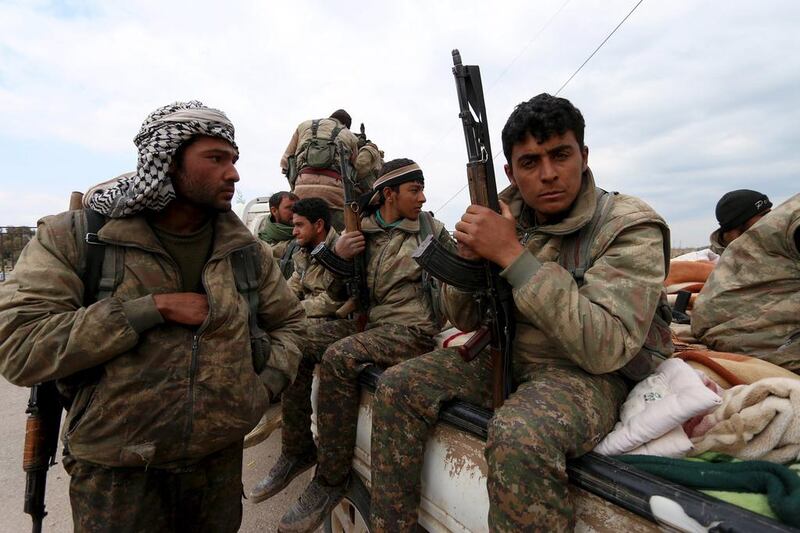When Syrian rebels from eastern Syria decided to join a US-backed effort to fight ISIL last year, Turkey advised them against it. The push against that move was an example, among many, of Ankara’s continuing obstructionist behaviour in Syria that often undermines not only the rebels’ interests but also its own.
In November, a group of Syrians from Deir Ezzor released a video announcing the formation of a new faction, the New Syria Army (NSA), dedicated to fighting ISIL. The NSA was trained in Jordan and funded by the United States. It works under Asalah wa Al Tanmiya, a Salafist organisation known for sponsoring other rebel factions dedicated to fighting ISIL in Syria. The NSA, fewer than three dozen in number, boasted its first successful fight against ISIL last week, when it expelled the group from the Iraqi-Syrian Tanf border crossing, near Jordan.
The number of fighters could have been much higher. Hundreds of Turkey-based fighters had initially expressed strong interest in joining the new venture. But Turkish officials, according to Syrians familiar with the episode, advised against joining the group. Officials even insinuated that joining the project would not be received well in Ankara and that they would not be allowed to operate through Turkey.
Turkish officials told representatives of the fighters that the new group would be seen as a US proxy and would therefore lack credibility among Syrians. Eventually most of the applicants changed their minds and did not join, and the NSA had around 30 fighters.
It is still unclear why Turkish officials pushed back against membership of the group. One reason could be that the leaders of the faction were viewed as not being committed to the fight against the regime in Damascus. Another reason is that the officials thought the group would operate in northern Syria, along with the Kurdish YPG, or the People’s Protection Units, whose growing role in northeastern Syria Turkey views as a national security threat.
Over the past five years, Turkey emerged as one of the top, if not the top, humanitarian supporter of the Syrian people fleeing violence in their country. No fair-minded Syrian can deny the generosity of Turkish authorities in this regard. Also, while it supported hardline militants groups, it generally did not prevent other countries from using its soil to provide help and support to moderate groups fighting the regime or extremist forces.
As an ally, however, Turkey has done considerable damage to the Syrian opposition by empowering hardline groups, misleading the rebels or obstructing efforts that could benefit them.
Last year, specifically, Turkey’s focus was on how to counter the growing strength of the YPG in northern Syria and, in the process, it manipulated opposition forces to serve as proxies.
For example, its promise of ISIL-free safe zones, deliberately drawn in Kurdish-dominated areas, raised hopes among the rebels that they could finally find a place that was out of reach of the regime’s barrel bombs. Rebel groups worked closely with Turkey to make it happen, including by asking Jabhat Al Nusra to leave the specified region to give way for Free Syrian Army battalions to run the supposed free zone.
The plan was quickly scrapped after the US agreed to pressure the YPG to refrain from expanding into that region. The rebels were left to feel they were exploited through a cynical game that did not involve them: tensions with the YPG increased without any apparent return on investment for the opposition, and Jabhat Al Nusra was able to tell the rebels it would not oppose a move intended to protect civilians and that they were naively played by their backers.
Turkey’s opposition to Jaish Al Thuwwar, a group of Arab fighters aligned with the Kurdish YPG under the Syrian Democratic Forces (SDF), is another example of its misguided approach in Syria. Rather than opposing Jaish Al Thuwwar, because it works with the YPG, Turkey should have supported increased Arab rebel involvement in the faction to counterbalance the YPG, which has taken a leadership position due to its strength and commitment relative to other SDF components.
A large rebel membership in projects like Jaish Al Thuwwar and the NSA would be welcomed by the US and would diminish the YPG’s ability to present itself as the sole committed force against ISIL.
Intuitively, Turkey might have calculated that alliance with the YPG would give it credibility and clout that make it hard to uproot later. But it is a short-sighted approach, and a more pragmatic one would be to swamp the northern anti-ISIL fighting front with aligned forces instead of trying to undermine it.
Of course, there are limits to how far Turkey can be blamed for pursuing its own interests. The opposition bears most of the blame for failing to act in accordance with its interests. The rebels should support initiatives such as the NSA and Jaish Al Thuwwar, if for no other reason than keeping the pressure on against ISIL while they bolster their fronts against the regime.
For the rebels, doing the right thing begins with recognising that countries involved in the conflict have narrow interests that may no longer align with their goal of bringing down Bashar Al Assad.
Hassan Hassan is a resident fellow at the Tahrir Institute for Middle East Policy, a think tank in Washington, DC, and co-author of ISIS: Inside the Army of Terror
On Twitter: @hxhassan





